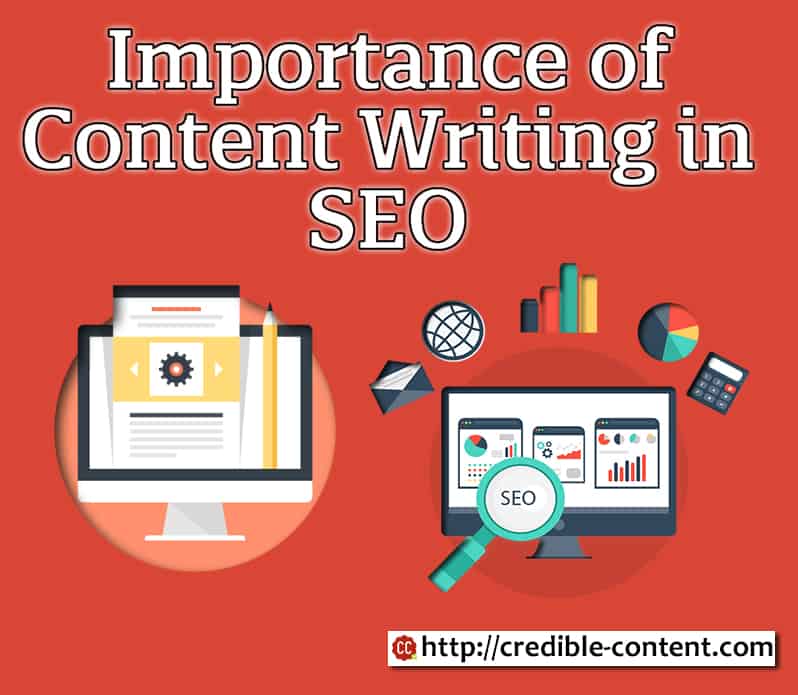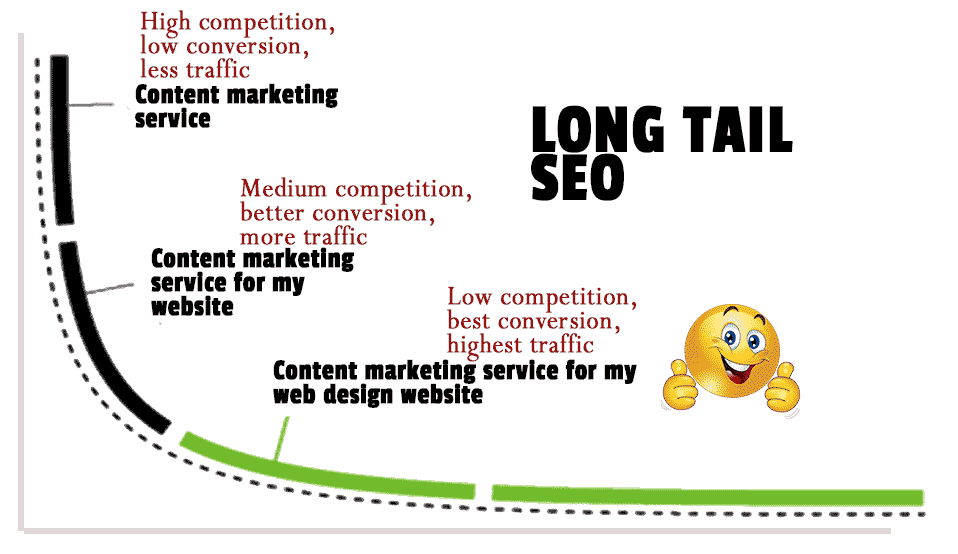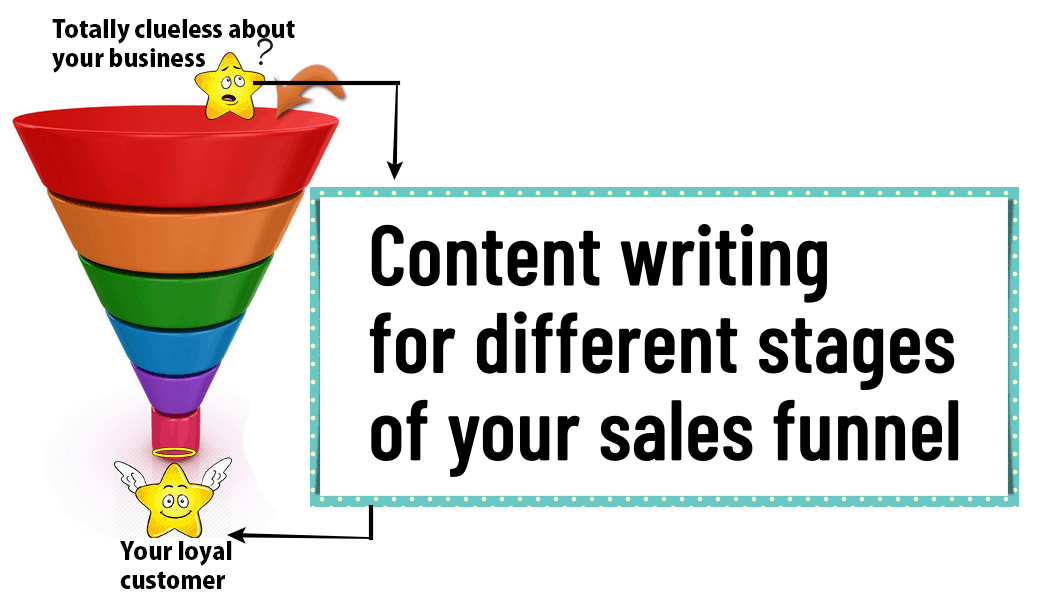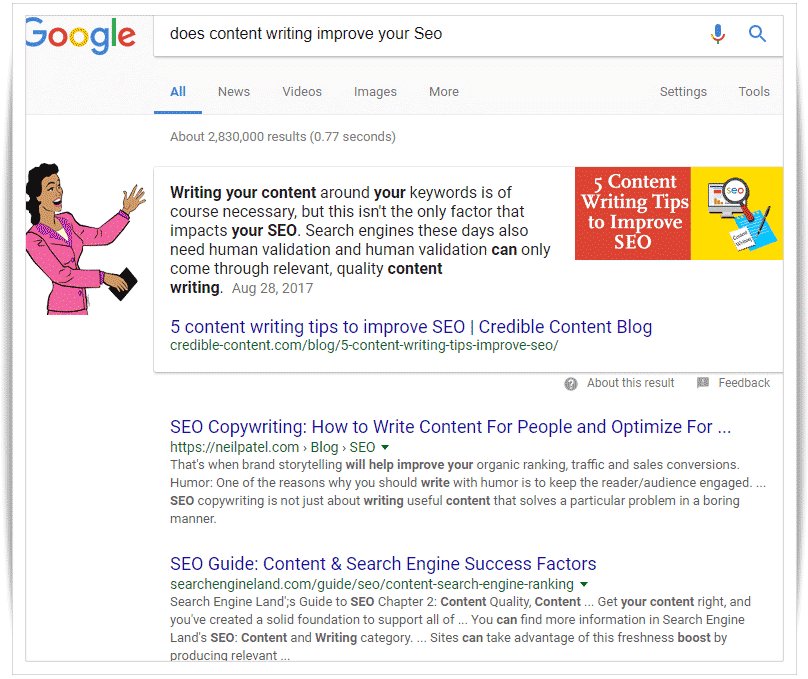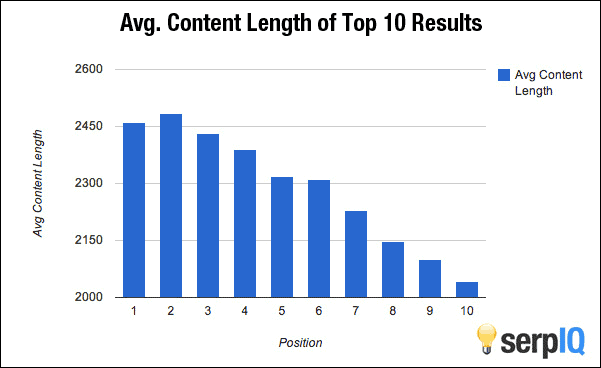Although SEO content writing is more of a way of identifying high-quality content rather than writing something specifically targeted at the search engines (which rarely works) it is a serious activity.
You want to attract traffic from search engines for your business and for that, you need to write content that delivers you the SEO results.
What is SEO content writing?
SEO writing focuses on your targeted keywords and phrases – use these keywords and phrases strategically throughout your webpage, article or blog post, enough times that the search engine algorithm thinks that these keywords and phrases are central to what you have published.
Since overuse of these keywords and phrases can be counter-productive (the ranking algorithm may think that you are trying to spam your way into better SEO), you also need to use alternative keywords and phrases.
You use these keywords and phrases in the title, headlines, in smaller headlines, in bulleted points, within the body text, and in hypertext.
There is no exact way of knowing how often you should repeat your targeted keywords and phrases, but the ideal ratio is 3-5%. They say that your keywords and phrases should appear every 150-200 words.
Usually, to improve your SEO through content writing, you prepare a list of phrases containing your targeted keywords and then you publish a series of webpages, articles, and blog posts handling individual phrase as part of a title.
For instance, if I want to generate traffic to my website for the search term “SEO content writing” or “SEO writer”, or “SEO content writer” I should write and publish lots of content having these terms in the title, but without repeating the same thing over and again. Every page must be unique.
As a trained and experienced SEO writer I help my clients come up with SEO writing that covers all their primary and secondary keywords without creating duplicate content. You do it regularly, and it is called SEO content writing.
I would like to stress again, writing for SEO doesn’t exist in isolation. Better SEO is a byproduct of high-quality content that is relevant, solves the purpose and delivers value to your visitors.
Writing SEO content for your business
It is very important to know at the outset what type of traffic you want to get from the search engines. You may think that the obvious answer is, traffic that grows your business, but things are not as simple as they may seem.
Remember that millions of pieces of content are being generated every minute on the web. On WordPress.com alone, 70 million posts are published each month (source).
The search engine algorithms have to make sense of this massive amount of information and then decide which piece of information should be ranked how, and based on which keywords and search terms.
So, you need to be very careful when preparing a list of keywords. You don’t want to generate traffic for every keyword suggested by the keyword tools you might be using.
Below I am listing a few things you can do to write the most appropriate SEO content for your business. As an experienced SEO content writer, I have been following this method to write SEO content for my clients.
Prepare a list of keywords and phrases in advance
This gives you a direction and keeps you focused. Spend ample amount of time preparing a list of main keywords and secondary keywords and also associated keywords.
When choosing keywords make sure that they are relevant to your business.
Again, take for example this blog post. The main focus here is SEO content writing, SEO writing, SEO writer and SEO content writer. It is not SEO or search engine optimization. I don’t provide search engine optimization services. I provide writing services.
Hence, through this blog post, my intention is to explain how I can use my writing to get you better search engine rankings. Hence, writing and content writing are very important although I’m constantly talking about SEO.
Similarly, if you are a web design agency, then many of your titles must contain this phrase “web design agency” because people should be looking for a company that designs websites rather than a website portal that teaches people how to design websites. This may seem similar, but this small difference can make or break your business on the web.
Things to keep in mind when optimizing your content writing for your keywords:
- Use your primary or main keywords and phrases for the page title and the main headline.
- Use your primary or main keywords and phrases in the first 100-150 words.
- Use variations of your keywords and phrases throughout the copy.
You may like to read How to do keyword research before beginning to write content.
Focus on longtail keywords when writing content
The importance of focusing on longtail keywords can never be stressed enough.
Keywords are normally two-word expressions whereas, longtail keywords usually contain 3-4 words for even more. They may carry a complete question, for example, “content writing service for my web design business”. This is very specific.
Longtail keywords are known to have less competition compared to shorter keywords and they are easier to optimize. They also have better conversion rate because they represent precisely the content people are looking for.
You may like to read How to double or triple your traffic by using long tail keywords in content writing?
Know why you are writing a particular piece of content
As I have written above, it is not as simple as it seems.
Below I will be talking about writing content for different stages of your sales funnel.
Whenever you write a blog post or a webpage, have a clearly-defined purpose for it. For example, the purpose of this blog post is to give you valuable information on how to do SEO writing or how to instruct your SEO writer to help you improve your SEO through content writing.
In fact, your conversion depends on how well you understand the purpose of what you are publishing.
Every blog post and every webpage isn’t intended to generate direct business for you.
Sometimes you write to increase your subscribers. Sometimes you write and publish because you want people to download your e-book, case study or white paper.
Sometimes you just want to prove your expertise or creativity.
Write your content in the form of questions and answers for better SEO
When people are searching the web, they are mostly asking questions, especially nowadays when people speak into their devices rather than typing in their queries.
You may like to read How to optimize content writing for voice search.
Writing your content in the form of questions and answers has multiple benefits. It provides ready-made answers to search engines like Google. It satisfies “searchers intent” and consequently, gives further boost to your SEO. It improves your conversion rate because people find answers they are looking for.
To achieve this, you can prepare a comprehensive FAQs section. You can prepare individual blog posts dedicated to singular questions and their answers.
Focus on quality first and then on keywords and phrases when writing SEO content
No matter how lightly you may take search engines like Google, one thing you must admit, very highly intelligent minds are working at improving the search engine ranking algorithms 24×7.
Search engines like Google and Bing exist for their ability to find information people are looking for. This is very important “information people are looking for”, and not “information you think people should find”.
When you think in terms of “information you think people should find” you try to manipulate your content. You want to be found even when people don’t want to find you. This is a lose-lose situation for all the parties involved including you, the people who find you on search engine pages, and even the search engines. Nobody’s purpose is being solved.
Don’t trick people into visiting your website.
Many mistakenly conclude that once people are on their website, somehow, they will be convinced and then they will do business. This doesn’t happen. People immediately leave your website if they think they have landed on a wrong link. They won’t explore your website if they are disappointed in the first place.
Hence, focus on relevance. Focus on quality. Focus on meaningfulness. Focus on purposefulness. Then think of your keywords.
This is not very difficult. Choose your topics carefully, and then provide as much information as possible on those topics, preferably arranged under various headlines and bulleted points.
Target different stages of your sales funnel to increase your content and consequently, improve your SEO
You need to attract traffic for all the stages of your sales funnel. The broadest stage of your sales funnel consists of people who are simply researching and haven’t yet made up their minds whether they need your product or service or not.
For them you will write educational content. For example, on my website you will find lots of webpages and blog posts talking about the benefits of using quality writing. Through such webpages and blog posts, I target people who want to improve their conversion rate and their SEO but don’t know that content writing can achieve this for them.
I try to target questions like “How can I improve my conversion rate?” Or “How can I improve my search engine rankings?”, and so on.
Then there is a stage where people know that they need an experienced writer for their website, but they don’t know whom to hire. For such people, I regularly write and publish webpages and blog posts such as Why you should hire me as your content writer?
Keep your sales funnel in front of you when researching keywords for SEO writing or ask your SEO writer to do the same.
Use a mind mapping tool to organize your thoughts when writing SEO content
Although, this is less about writing and more about efficiency, you will be surprised to know how well you organize your thoughts using a mind mapping tool like XMind.
There are two benefits of using a mind mapping tool: You organize your thoughts in monosyllables, words and phrases, and the entire map of your webpage, article or blog post is in front of you. Everything that you need to cover, you can put in the mind map so that when you are writing, you don’t forget about covering something important.
A mind mapping tool like XMind also allows you to insert notes and hyperlinks so, under various sections, you can also put in research material.
Use Google Analytics to streamline your SEO content writing process
Google Analytics in combination with Google Search Console, can give you lots of information about what sort of traffic your content is attracting from Google.
Google Analytics may not tell you what keywords and phrases you should be covering to write your content as a writer, it certainly tells you which keywords and phrases are attracting search engine traffic. This tells you whether you are in the right direction or not or whether you need to change the focus of your content.
If certain topics are getting more traffic, and this is the right sort of traffic, you can create similar topics or add more information to those topics.
If certain pieces of content are attracting traffic for all the wrong reasons, you can make changes, or even take them down and rewrite them.
Follow an SEO-friendly format when writing content for your business website
It is often advised that when you are writing content for search engines, write in a manner that even if someone quickly browses through your webpage, he or she can make out what you are talking about.
Organize your content under various headings and subheadings and through these headings and subheadings, highlight what you are going to present in the following text.
If there are some step-by-step instructions, use bulleted points instead of simple paragraphs. It’s easier to read bulleted points.
You can also make important portions bold.
Basically, make it easier to make sense of what you have written even without reading each and every word. This is how crawlers go through your content. They go through the highlighted portions in most of the cases to save time.
Another thing, don’t use very big paragraphs. Preferably, use a single sentence as a single paragraph. This seems annoying to some, but it makes it easier for search engine crawlers to go through your content.
Write your content in such a manner that it is optimized for Google’s Featured Snippets
This is also more or less a formatting issue: express the main answer to the hypothetical question being raised by the title of your blog post in such a manner that Google can pick it up as a “Featured Snippet”.
According to Ahrefs, if your link shows up as featured snippet, it gets 31% more traffic compared to your top position without the featured snippet.
You may like to read Google’s Featured Snippets: How to rank at #1 with strategic content writing.
Write longer blog posts, preferably 2000-2500 words
The ideal word length should be 2100 words, according to this Hubspot study.
My very simple logic is, it is difficult to come up with 2000-2500 words on a topic. You need to have a lot to say. You need to have lots of information. To gather and compile and then write this information is an arduous undertaking. Hence, if you can achieve this, you have an edge over people who cannot achieve this.
A SerpIQ study concluded that among the top 10 results, links having position #1 on an average have a little over 2450 words. Even among the top 10 results, the #10 place has more than 2000 words. Here is the graph:
This may not be true for every industry but my personal experience shows that longer blog posts have an edge over shorter blog posts.
As a content writer who focuses more on the readers and less on search engines, I believe that your SEO should be a byproduct of your quality writing. Focus on delivering and your search engine rankings automatically improve.



